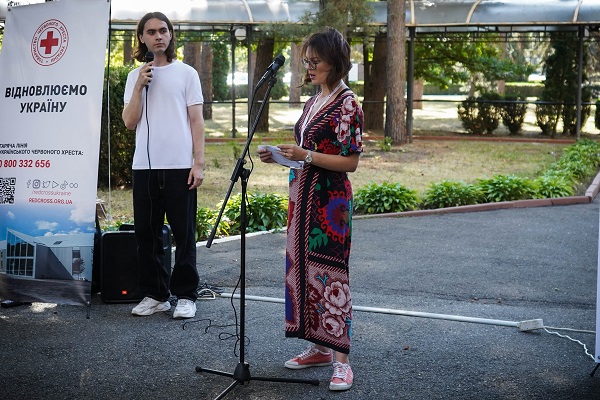 Myriam Jacoby, Project Manager for Ukraine at Luxembourg Red Cross, speaking at the inauguration of a repaired rehabilitation centre in Liutyzh, Ukraine, in September 2023;
Credit: Ukrainian Red Cross Society
Myriam Jacoby, Project Manager for Ukraine at Luxembourg Red Cross, speaking at the inauguration of a repaired rehabilitation centre in Liutyzh, Ukraine, in September 2023;
Credit: Ukrainian Red Cross Society
Amid the ongoing conflict in Ukraine and escalating violence in the Middle East (and numerous other crises around the world), Chronicle.lu reached out to Luxembourg-based non-profit and non-governmental organisations to learn about their current priorities and responses.
In recent weeks and months, international news headlines have shifted from one crisis to another, from wars to natural disasters. Whilst the conflict in Ukraine continues to drag on, the focus shifted recently towards the "fresher" news of renewed / escalating violence in the Middle East, following the Hamas terrorist attacks on Israel and the latter's response. Earlier in the year, there were the deadly earthquakes in Turkey and Syria, and later in Afghanistan, and the deadly floods in Libya, as well as the ongoing food crisis across Africa.
Myriam Jacoby, Project Manager for Ukraine at the Luxembourg Red Cross, explained that this national society, which forms part of a wider movement, is active in ten countries, mainly in Africa, Nepal and Ukraine. For context, the International Red Cross and Red Crescent Movement is a global humanitarian movement composed of three parts: the International Federation of Red Cross and Red Crescent Societies (IFRC), the International Committee of the Red Cross (ICRC) and 190+ National Red Cross and Red Crescent Societies (including the Luxembourg Red Cross). Each national society is independent and coordinates actions within their country, although they also work together and help each other. The movement must always remain neutral, not taking sides in a conflict, but focusing on meeting the needs of the vulnerable.
Myriam Jacoby is also a team leader within the IFRC's Emergency Response Unit (ERU) Benelux, which specialises in relief operations. ERU volunteers are trained to respond to disasters or armed conflicts within 48 hours (deployed upon request and depending on the specific needs).
As Ms Jacoby explained, there is currently no one from the Luxembourg Red Cross in Gaza, where Red Cross humanitarian efforts are being coordinated by the IFRC and the ICRC who work together with the Palestine Red Crescent Society and Magen David Adom in Israel. The Luxembourg Red Cross supports these efforts through fundraising. Whilst there is no specific appeal from the national society, anyone wishing to support the Red Cross' humanitarian work in Gaza can do so via the Luxembourg Red Cross website, mentioning they wish to dedicate the donation to Gaza: https://www.croix-rouge.lu/en/. The money will be sent onto the relevant beneficiary within the movement.
As for Ukraine, where there is an ongoing appeal, the Luxembourg Red Cross has been active there for more than 30 years but strengthened its presence following Russia's full-scale invasion in 2022. Activities currently focus primarily on healthcare, for example repairing and rebuilding damaged infrastructure such as hospitals and rehabilitation centres and providing equipment and medication. One seemingly small but important task, according to Myriam Jacoby, is repairing broken windows and fitting them with anti-shatter film to prevent further damage whilst continuing to allow light in. This also helps patients retain some "connection with the outside world." Other priorities include delivering electric generators and fuel to prepare healthcare facilities for an uncertain winter. Ms Jacoby noted that the Luxembourg Red Cross can count on existing links with Ukrainian authorities such as the Ministry of Health to better meet the actual needs on the ground.
The Luxembourg Red Cross has a team on the ground in Ukraine and manages its own local projects and programmes together with the Ukrainian Red Cross and the wider Red Cross and Red Cresent network. In terms of access, Myriam Jacoby emphasised that the Red Cross has volunteers everywhere, which makes it easier to know the actual needs. In Ukraine, postal and logistics services generally work well, although access is more challenging in areas such as Avdiivka and Bakhmut where there is heavy fighting and the situation is "very tense".
Regarding donations and whether support has remained stable over time, Myriam Jacoby acknowledged that people now seemed "exhausted about what is going on in Ukraine." She described a general drop in donations for humanitarian crises as a "worldwide problem" and said that it was "normal" for people to lose interest, "especially now as eyes turn to other crises." Nevertheless, she feared that this decline would make supporting Ukraine in the coming years more challenging, reiterating that the conflict is ongoing and the needs are still there. Probable issues in the coming months are linked to water supply, particularly following the destruction of the Kakhovka Dam.
Concerning the recent news of the Luxembourg Government's humanitarian aid contribution of €2.3 million to be split among various organisations, including the ICRC, Myriam Jacoby noted that the Ministry of Foreign and European Affairs has dedicated part of its funding to supporting Ukraine and the Luxembourg Red Cross is included within these commitments. Whilst there may be some changes on the horizon following the recent legislative elections, Ms Jacoby remained "convinced" that the next Luxembourg Government would continue to support humanitarian causes (including in Ukraine). She recalled that the Luxembourg Red Cross (together with Caritas Luxembourg) recently had the chance to make its voice heard within the framework of ongoing coalition talks, and was hopeful some of the points raised would be taken into consideration.








